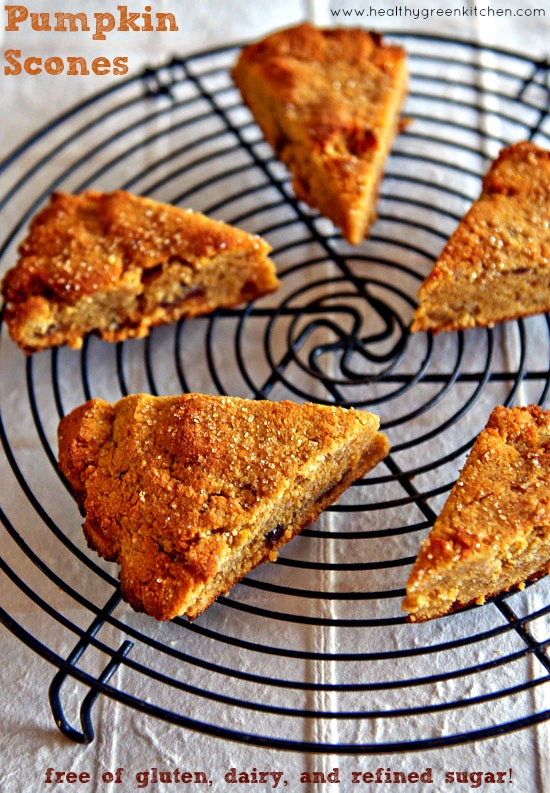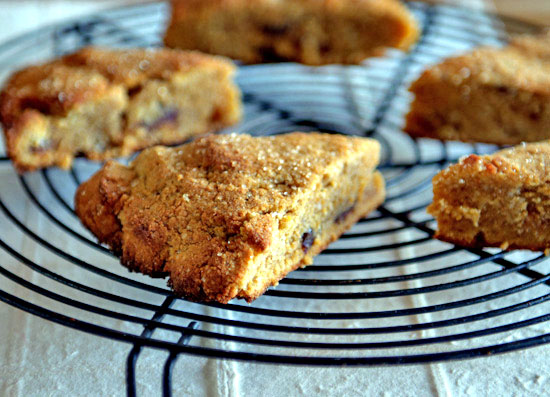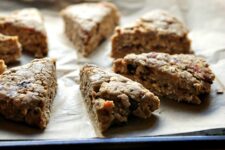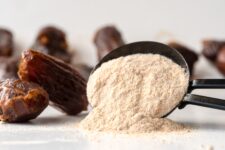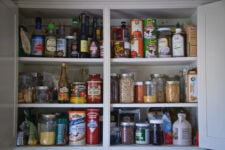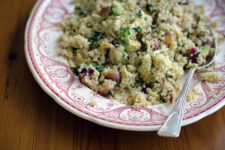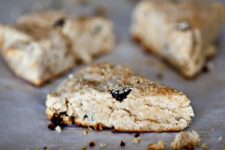Hello, my friends! It’s Friday and I have a new One Simple Change post to share with you today…all feels right in the world again :) I also have a great recipe for Pumpkin Scones!
I always planned to write a post about sugar but to be honest, I’ve been a little worried about doing so because…well…sugary treats are awfully popular in the blogosphere. But with October Unprocessed right around the corner (it starts Monday, people…go sign up!) and since Andrew did a great post on sugars and sweeteners just the other day, I was inspired to get going on my own.
Here’s the thing: I like sweets as much as the next person. But I also know first hand that eating too much sugar can be problematic.
At one point in my life, I ate quite a lot of sugar. This was back when I was a diet-obsessed teen: I craved and ate sugar pretty much constantly (as long as it wasn’t accompanied by fat…I avoided fat like the plague). Non-fat frozen yogurt was my very best friend and we got together to hang out several times a day. I’m not going to go into all the details here but suffice it to say that I really messed up my body by eating that way for years: my diet was terribly imbalanced and it really took a toll on my health. It took a real commitment to eating a balanced whole foods diet- one full of protein, high quality carbohydrates, and healthy fats (and I also gave up sugar for a little while) in order to get better.
I have a different relationship to sugar now. I don’t crave it like I did before because my diet is balanced. I use very little white sugar at all because I don’t think it fosters optimal health (I use it when I am canning, but that is about it): when I am sweetening something, I always try to choose organic, unrefined sweeteners that have some redeeming qualities (see later in the post for suggestions).
How do YOU know if you are someone who should be concerned about sugar? Well, if you eat packaged/processed foods, your diet may be pretty high in sugar (and likely high fructose corn syrup) because things like breakfast cereals, donuts, cookies, cakes, candy, and sodas are loaded with it. These foods also contain unhealthy fats, preservatives, and other chemicals, so I hope you don’t rely on them too often. There are so many healthy things to have for breakfast other than packaged cereals, and if you want to eat baked goods, then I suggest you make them yourself. A dessert made at home with high quality ingredients such as unrefined sweeteners, organic flours, and real butter is much better for you and your family than something you buy at the store made with less-healthy ingredients.
There is also a lot of sugar added to packaged foods that are marketed as healthy. Manufacturers add sugar to replace the fat in low-fat foods; many brands of granolas and yogurts have quite a bit of added sugar, too. Read. The. Labels. And make these foods yourself if you are so inclined. I have a few different granola recipes here on my blog, and I have a recipe for homemade yogurt, too.
So, would it be best if we all didn’t eat any sugar at all? Some health experts seem to think so, but I don’t necessarily agree. I think we can eat less without eating none at all.
I honestly believe we’re programmed to love the taste of sweet things because our body needs them. I don’t think all sweet foods are bad for you…I think they are fine when consumed in moderation as part of a balanced diet (and as part of a lifestyle that includes plenty of physical activity). I know there are people who are avoiding not just added sugar in their diet, but naturally sweet fresh and dried fruit and root vegetables because they are afraid these foods are bad for them. I think these fears are completely unfounded; I believe all of these foods to be quite healthy as long as they are not consumed in giant amounts (I don’t think anything should be consumed in giant amounts).
If you feel as if you are addicted to sugar/have a tendency to overeat sweet foods, be sure you are eating enough food, and enough protein and healthy fats…eating a nutrient-dense whole foods diet with enough calories distributed throughout the day seems to help people who tend to binge on sugar when they eat it! (One caveat: be careful about eating too much dried fruit- I once went on a month long dried mango rampage, then found out I had a few cavities…I don’t think it was a coincidence.)
While I do suggest avoiding processed store-bought baked goods (not just because they are high in white sugar, but again because they contain unhealthy fats, preservatives, etc.), this does not mean you cannot enjoy treats…you can bake your own! What should you use when baking or otherwise sweetening foods at home? I suggest exploring the range of natural (and preferably organic and fair-trade) sweeteners on the market: examples include sucanat™, rapadura™, and coconut sugar, raw unprocessed honey (this is why I got my own bees), real maple syrup and molasses. I also use jaggery and palm sugar on occasion, as well as organic fruit juice. All of these are less refined/processed than sugar (they also contain some minerals so they are not 100% empty calories). I used to feel good about agave but then I started reading bad things about it so I don’t really use it any more. If you do want to use it, make sure to look for organic, raw agave. See this for a full list of unrefined sweeteners…there are many I didn’t mention here. Note that some of these are more processed than others; again, go with the ones that are the least processed.
Some people may want or need to try low carbohydrate sweeteners like stevia or one of the sugar alcohols (like erythritol)…note that I have no experience using either one, but have heard good things from diabetic friends who do.
Whatever you do, don’t use artificial sweeteners. These are about as far as you can get from a natural food. They may have no calories, but your body still secretes insulin when you consume them because they taste sweet and your body is expecting sugar. So the insulin is floating around, but it has nothing to do…not good. The use of these will then cause you to crave sugar even more because the released insulin really wants some sugar to deal with. And another thing: artificial sweeteners contain known toxins…if you use them, please give them up. This means diet soda people, which you already know you shouldn’t drink.
Most all of the baked goods/dessert recipes on my blog are made with natural sweeteners, and here’s one I recently posted over at MindBodyGreen: Pumpkin Date Scones (which also happen to be gluten-free and vegan).
[cft format=0]
So what do you think? Do you already limit your refined sugar intake/use natural sugars? Or are you a white sugar fiend? As always, I’d love to hear your thoughts on this week’s One Simple Change.
Recipe for Pumpkin Date Scones
Ingredients
- *9 ounces almond flour about 2 ½ cups
- *1 1/2 ounces coconut flour just under 1/2 cup
- *2 teaspoons non-aluminum baking powder
- *2 teaspoons ground cinnamon
- *1/2 teaspoon fine sea salt
- *6 tablespoons demerara sugar or another unrefined granular sugar plus another 2-3 teaspoons for sprinkling on top of the scones before baking
- *3/4 cup packed canned organic pumpkin
- *1/4 cup organic coconut oil warmed so it’s a liquid, if necessary (coconut oil will melt in hot weather, but will be solid when the ambient temperature is cooler)
- *1/4 cup chopped organic pitted dates I soaked my dates in water for about 10 minutes to soften them before removing the pits or raisins
Instructions
- 1. Preheat oven to 400 degrees F.
- 2. Combine the almond and coconut flours in a medium bowl and whisk with a fork. Add the baking powder, the salt, and the sugar and whisk again.
- 3. Add the pumpkin, the coconut oil, and the dates or raisins to the flour mixture. Combine all the ingredients with a wooden spoon (or your clean hands) until a ”shaggy” dough forms. If the dough seems too wet, you can add a bit more almond or coconut flour.
- 4. Turn the dough out onto a baking sheet lined with parchment paper (or a silicone baking pan liner) and flatten it into a thick circle. Cut the dough into eight equal triangle-shaped pieces, and then sprinkle the top of the scones with the additional organic sugar (press the sugar down a little so it adheres to the scones).
- 5. Move the pieces apart a bit so the scones are separated from each other by an inch or two, then bake until they are starting to brown on top. Start checking at 15 minutes, but these should take 18-20 minutes to bake. Transfer to a rack to cool before serving.

